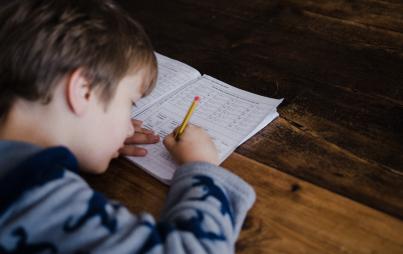
They need reassurance that nothing they did was the cause of what happened.
This article originally appeared on Divorced Moms and has been republished with permission.
Anyone in the throes of a divorce knows that there are many different emotions involved ranging from sadness, anger, anxiety to relief, contentment and peace. Realize your children will also have varying degrees of emotions throughout the process that should also be addressed.
Normal reactions for children during a divorce could be anger, anxiety or mild depression. They might become more irritable and possibly regress in behavior. Some teens might rebel and get themselves into trouble. If you are not cautious, your divorce may affect your children’s mental health. As their parent, you have the responsibility to not let that happen and to help them keep their sanity at this time of chaos. Here are some tips to help you in this endeavor.
1. Do not fight in front of them.
It is okay to disagree in front of your children if you “fight fair” and respectfully, however, this is not usually the case when two people are divorcing. Your children do not need to know all the details of why he was wrong or what he did to upset you.
2. Do not badmouth the other parent.
No matter how you feel about your soon to be ex, he is still your child’s father and has a separate relationship that should not be tainted by your negative feelings about him.
3. Do not try to keep them from the other parent (unless under special circumstances such as substance abuse, physical abuse, etc).
Your child deserves to have a relationship with his/her father and to spend quality time with him. It is for their own well-being that you nurture a positive and happy relationship for them.
4. Try to keep them to as much of their routine as possible.
Kids thrive on routine and knowing what will happen next. Their world as they knew it is changing drastically so the most you can stick to a routine with them the better off they will be. Have a calendar in the house showing them when they will be staying with each parent.
5. Tell them you love them.
Keep reminding them because although you can’t imagine they don’t know it, your kids need that reassurance as much as possible. They might think if you get mad enough at them you will divorce them too.
6. Pay attention to them.
Put down your phone and shut off your computer when you are with your kids. Show them they are important to you and that other things can wait.
7. Listen to them and help them express and acknowledge their emotions.
Keeping their feelings inside will only lead to more problems as time goes on. It is best to teach your kids how to say how they feel and that they are heard.
8. Take them to a therapist.
Know when it is time to have them speak to a professional by gauging their behavior. You know your kids and how they usually handle stress. If you see changes in their sleeping or eating habits, if they are becoming less tolerant of frustration, if they are irritable all the time or seem sad much of the time, know that by bringing them to a professional might be the best way to keep them sane during this insane time.
9. Remind them it is not their fault.
Kids might blame themselves for the divorce. They need reassurance that nothing they did was the cause of what happened. They also need to know how much you love them and, despite what they think, you are looking out for what is best for them.
10. Make sure you take care of your own mental health as well.
This cannot be repeated enough times. Put on your oxygen mask first so you can then take care of your children. If you are not in a good mental and physical state it will not be so easy to take care of those who look up and need you to take care of them and their needs as well.
Follow the “Children’s Bill of Rights, typically found in your divorce agreement. This outlines the rights your children should have when their parents go through a divorce, however, unfortunately, this is not always the case.
- The right not to be asked to "Choose Sides" between the parents.
- The right not to be told the details of bitter or nasty legal proceedings going on between the parents.
- The right not to be told "Bad Things" about the other parent's personality or character.The right to privacy when talking to either parent on the telephone.
- The right not to be cross-examined by one parent after spending time with the other parent.
- The right not to be asked to be a messenger from one parent to the other.
- The right not to be asked by one parent to tell the other parent untruths.
- The right not to be used as a confidant regarding the legal proceedings between the parents.
- The right to express feelings, whatever those feelings may be.
- The right to choose not to express certain feelings.
- The right to be protected from parental warfare.
- The right not to be made to feel guilty for loving both parents.
More from Divorced Moms:








